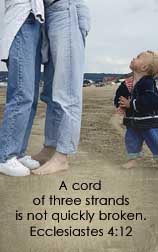Tuesday, May 25, 2010
School's Out for the Summer?
4:24 PM |
Edit Post
I'm all of a sudden hearing people talk about the school year being over.
Honestly, I'm quite oblivious to it. While I know some homeschooling moms who plan every moment of their school year (months in advance), I'm just not that way!
For our family, education is life, and life is education. Sitting at the table with academic subjects takes up very little of our weekly schedule. I expect this to change somewhat as my children grow older, but for now Bible, the three R's, and history/geography are the only things we teach in a way that at all resembles "school".
That being said, we don't plan to take a break from school just because it is summer. I can scarcely imagine ceasing to educate my children any more than I can fathom ceasing to feed them. To be sure, our focus will change from mainly indoor activities to mainly outdoor ones...but stop learning? I'd sooner cut off my right arm.
Summer is a great time to learn! If you need some inspiration, here is a list of ten things to try. Please leave some ideas of your own in the comments section!
1. Keep Up With the Basics. Most kids do best academically when reading, writing, and math are reinforced throughout the year. You don't have to be intense about it, but taking a little time each week to practice the things that you've already mastered will go a long way when fall comes around. Most conventional schools have to spend a great deal of time reviewing last years information before they can introduce new concepts. You can avoid this in your homeschool by simply stretching your curriculum to fill the summer months. Since most curriculum is written to fit a typical school year, this gives you the added freedom to take time off when you need it.
2. Take a Scripture Memory Challenge. There are many different ways to do this. Ultimately, though, it is about hiding God's Word in our hearts, so just find a way to do it! Some families decide to memorize an entire chapter or book of the Bible together. Another way would be to study for the 2010 BibleBee. My children are not yet old enough to participate, but I contacted The National Bible Bee, and they said that we could still purchase a study kit for our family when they go on sale in June. Or, check out one of the free Scripture Memory Lists from Bethlehem Baptist Church, located in the Twin Cities of Minnesota.
3. Study Nature. Spend time in your backyard watching birds. Go on a hike in the woods. Go fishing or take a walk by lake or river. Anna Botsford Comstock's Handbook of Nature Study is a great tool for parents of children of all ages. It gives the basics (for those of us who are truly clueless), and goes into depths that even a high school student can appreciate.
4. Plant a Garden. I am famous for my brown thumb (just ask my college dorm mates about how I managed to kill a cactus!), but I've determined that, for the educational good of my children, we will have a garden this year. So far, we've taken on some already-started plants that will come back every year and be pretty hard to kill-even for me. In addition, we're going to plant a window box with basil. I've done this before and, surprisingly, it actually worked. The kids are hoping to get a tractor-tire planter in the back yard where they can plant their own seeds. Still working on the logistics of that one.
5. Visit a farm. If you can't, or don't want to plant a garden, how about visiting a local farm regularly? We have the blessing of having a small organic farm close by. We volunteer three hours of our time there every week during the summer, and in exchange, we come home with a big box of fresh produce and eggs. The children can't get enough of that place, and I have learned a lot from the wise people I have met there. It also makes me grateful for how easy it is for us to obtain the food we eat, even when money is tight. There's nothing like working out in the soil in the hot sun to make me ponder just how hard most people have had to work, throughout the history of the world, just to eat.
6. Spend time at the library. Of course, most of us don't want to spend every moment of every day outside. Sometimes, we just want to drink in some air conditioning! When it's too hot to do anything else, we like to take a field trip to the library. We can sit and read together in the children's area, or just gather a stack of books to take home with us. Many libraries have summer reading programs, where children can receive free books and other prizes for reading a certain number of books or for a certain number of minutes each day. Since we're avid readers in this house, it is easy for us to meet the requirements and win all the cool prizes. Last summer, the kids each came home with three new books, an adorable book bag, plus a coupon for a free scoop of frozen custard. Yum!
7. Visit Historic Sites, Landmarks, or Museums. You probably have a few of these nearby, and they probably host special events during the summers. Spend some time with your state's tourism website to find out what and when they are. We have gleaned so much from these summer family field trips. Reading about history in a book is one thing. Seeing it, touching it, and tasting it is quite another. Late last summer, I blogged about one of our favorite historic field trips to the Wade House in Greenbush, WI
8. Play Dates! Fun with friends is generally a lot easier to schedule during the summer months. Why not get together with friends at a local park or beach? Or maybe have a picnic or bonfire in the backyard? Time invested in building relationships is time well spent.
9. Enjoy a Sport. Participating in year-long athletic activities can be expensive in both time and money. However, it can be more affordable and less intense to join a summer league or class. It can also be a great time to take swimming lessons at a local pool.
10. Consider Camping. There's hardly a better way to enhance family togetherness than camping, and it's a lot easier on the budget than other vacation options. Teach your kids how to build a fire, cook "the old fashioned way" and wash dishes by hand in a bucket. They'll quickly learn to appreciate indoor plumbing, refrigeration and electricity! They'll also probably learn a lot more about their parents. If you ask around, you may even find that there is a Christian camp not-too-far-from-you that caters to family campers. We don't think we'll be big on sending our kids away to camp--even when they're older--but family camping is right up our alley!
So, that's my list...what's yours?
Honestly, I'm quite oblivious to it. While I know some homeschooling moms who plan every moment of their school year (months in advance), I'm just not that way!
For our family, education is life, and life is education. Sitting at the table with academic subjects takes up very little of our weekly schedule. I expect this to change somewhat as my children grow older, but for now Bible, the three R's, and history/geography are the only things we teach in a way that at all resembles "school".
That being said, we don't plan to take a break from school just because it is summer. I can scarcely imagine ceasing to educate my children any more than I can fathom ceasing to feed them. To be sure, our focus will change from mainly indoor activities to mainly outdoor ones...but stop learning? I'd sooner cut off my right arm.
Summer is a great time to learn! If you need some inspiration, here is a list of ten things to try. Please leave some ideas of your own in the comments section!
1. Keep Up With the Basics. Most kids do best academically when reading, writing, and math are reinforced throughout the year. You don't have to be intense about it, but taking a little time each week to practice the things that you've already mastered will go a long way when fall comes around. Most conventional schools have to spend a great deal of time reviewing last years information before they can introduce new concepts. You can avoid this in your homeschool by simply stretching your curriculum to fill the summer months. Since most curriculum is written to fit a typical school year, this gives you the added freedom to take time off when you need it.
2. Take a Scripture Memory Challenge. There are many different ways to do this. Ultimately, though, it is about hiding God's Word in our hearts, so just find a way to do it! Some families decide to memorize an entire chapter or book of the Bible together. Another way would be to study for the 2010 BibleBee. My children are not yet old enough to participate, but I contacted The National Bible Bee, and they said that we could still purchase a study kit for our family when they go on sale in June. Or, check out one of the free Scripture Memory Lists from Bethlehem Baptist Church, located in the Twin Cities of Minnesota.
3. Study Nature. Spend time in your backyard watching birds. Go on a hike in the woods. Go fishing or take a walk by lake or river. Anna Botsford Comstock's Handbook of Nature Study is a great tool for parents of children of all ages. It gives the basics (for those of us who are truly clueless), and goes into depths that even a high school student can appreciate.
4. Plant a Garden. I am famous for my brown thumb (just ask my college dorm mates about how I managed to kill a cactus!), but I've determined that, for the educational good of my children, we will have a garden this year. So far, we've taken on some already-started plants that will come back every year and be pretty hard to kill-even for me. In addition, we're going to plant a window box with basil. I've done this before and, surprisingly, it actually worked. The kids are hoping to get a tractor-tire planter in the back yard where they can plant their own seeds. Still working on the logistics of that one.
5. Visit a farm. If you can't, or don't want to plant a garden, how about visiting a local farm regularly? We have the blessing of having a small organic farm close by. We volunteer three hours of our time there every week during the summer, and in exchange, we come home with a big box of fresh produce and eggs. The children can't get enough of that place, and I have learned a lot from the wise people I have met there. It also makes me grateful for how easy it is for us to obtain the food we eat, even when money is tight. There's nothing like working out in the soil in the hot sun to make me ponder just how hard most people have had to work, throughout the history of the world, just to eat.
6. Spend time at the library. Of course, most of us don't want to spend every moment of every day outside. Sometimes, we just want to drink in some air conditioning! When it's too hot to do anything else, we like to take a field trip to the library. We can sit and read together in the children's area, or just gather a stack of books to take home with us. Many libraries have summer reading programs, where children can receive free books and other prizes for reading a certain number of books or for a certain number of minutes each day. Since we're avid readers in this house, it is easy for us to meet the requirements and win all the cool prizes. Last summer, the kids each came home with three new books, an adorable book bag, plus a coupon for a free scoop of frozen custard. Yum!
7. Visit Historic Sites, Landmarks, or Museums. You probably have a few of these nearby, and they probably host special events during the summers. Spend some time with your state's tourism website to find out what and when they are. We have gleaned so much from these summer family field trips. Reading about history in a book is one thing. Seeing it, touching it, and tasting it is quite another. Late last summer, I blogged about one of our favorite historic field trips to the Wade House in Greenbush, WI
8. Play Dates! Fun with friends is generally a lot easier to schedule during the summer months. Why not get together with friends at a local park or beach? Or maybe have a picnic or bonfire in the backyard? Time invested in building relationships is time well spent.
9. Enjoy a Sport. Participating in year-long athletic activities can be expensive in both time and money. However, it can be more affordable and less intense to join a summer league or class. It can also be a great time to take swimming lessons at a local pool.
10. Consider Camping. There's hardly a better way to enhance family togetherness than camping, and it's a lot easier on the budget than other vacation options. Teach your kids how to build a fire, cook "the old fashioned way" and wash dishes by hand in a bucket. They'll quickly learn to appreciate indoor plumbing, refrigeration and electricity! They'll also probably learn a lot more about their parents. If you ask around, you may even find that there is a Christian camp not-too-far-from-you that caters to family campers. We don't think we'll be big on sending our kids away to camp--even when they're older--but family camping is right up our alley!
So, that's my list...what's yours?
Subscribe to:
Post Comments (Atom)
Subscribe via email
About Me

- Tiana
- I'm a Stay-at-Home, Christian, "crunchy" mama. I have been blessed with the calling to be a godly wife and mother. I am passionate about bringing up my children in the discipline and instruction of the LORD, through home education and discipleship. Helpmeet to my best friend and soulmate, Christopher since 1/29/2000, and mama to four little blessings, including a tiny, precious, newborn baby girl.
Most Popular Posts
- "Being Equipped" and the Will of God
- "Doing School"
- A Little Bit of Spontaneity
- Am I Really Content?
- Coming Out of the Closet
- Desperate for Discipleship
- Don't Be Afraid, Have Faith
- How Doing Something "Good" Can Keep You From Obeying
- Is it Really All About Me?
- Over-Protected, Under-Sheltered
- Remembering Acacia's Birth
- Slow Homeschooling
- The Most Important Thing
- What Do You Mean, "Unsocialized?"
- What Does "Enough" Look Like?
Fixing Your Heart on Titus 2
My Wired Style
Our Curriculum 2010-2011
Bible--Child's Story Bible by Catherine Vos, Apologia Biblical World View Book 1, "Who is God and Can I Really Know Him?"
Catechism-- "Training Hearts, Teaching Minds" by Starr Meade
Phonics--Teach Your Child to Read in 100 Easy Lessons
Literature--Ambleside Online Year 0 Recommended Books
(Kindergarten), Year 1 Booklist (1st Grade)
Handwriting--Bible Copywork, made using Educational Fontware
Spelling-- All About Spelling Level 1 (1st grade)
Math--Math-U-See Primer (Kindergarten) , Math-U-See Alpha (1st grade)
Science--Apologia Exploring Creation With Astronomy
World History--Simply Charlotte Mason's Genesis Through Deuteronomy and Ancient Egypt
American History--The Light and The Glory For Children Series
Art--Interest-led projects and handicrafts
Geography and Missions-- "Hero Tales" by Dave and Neta Jackson, as well as various other missionary biographies, incorporating globe and map study
*We will be studying music and phy-ed., participating in a writing club and nature club, as well as attending various field trips, with our church's homeschool group.*
























5 comments:
I totally agree. We have homeschooled for 4 years and this will be the first where we schooled some through the summer. A light schedule of math, Bible, history, reading and grammar. She has lots of fun summer camps on the schedule too. Mostly dealing with art and drama which are her passions.
Blessings
Diane
Sounds very much like our summer plans! Love your list of goals...I'll be working on mine in a week or so too! I just function better with a list to refer to - helps me get to some of the stuff our family wants to get to!
Yep! We school year round too. It's lighter in the Summer, but Math, Reading and Spelling continue. I like taking lots of field trips/outings in the Fall months (so many historic sites in our state offer "free" days for homeschoolers.) Your Summer sounds wonderful, just like the rest of your year :)
Great ideas. We've been toying with the idea of year-round school, but we really needed a break this year. So maybe next year!
Hi. I just found your blog, and your summer sounds a lot like ours! Last year, I actually started school in July. This year, my son, who just finished 1st grade, is itching for a summer break, but has already worked on reading, math (money skills), science, and history through fun things like trips, library visits, store visits, and movies. He just didn't realize he was learning! (hee-hee!)
Post a Comment